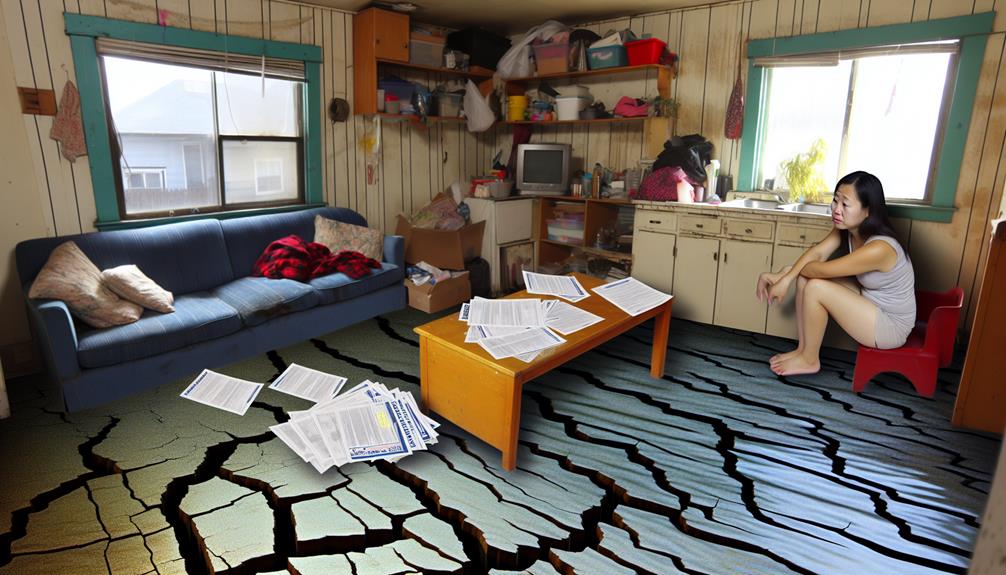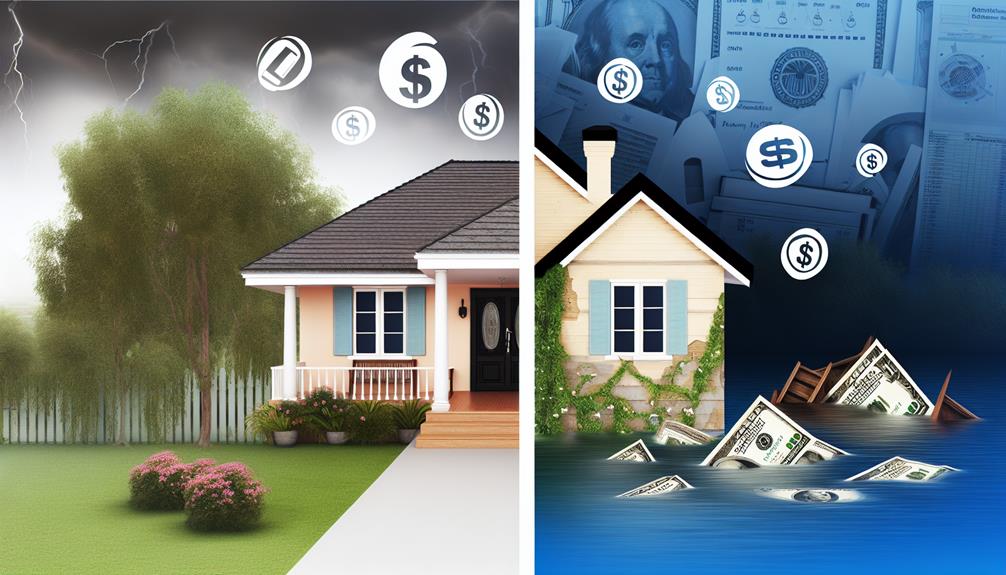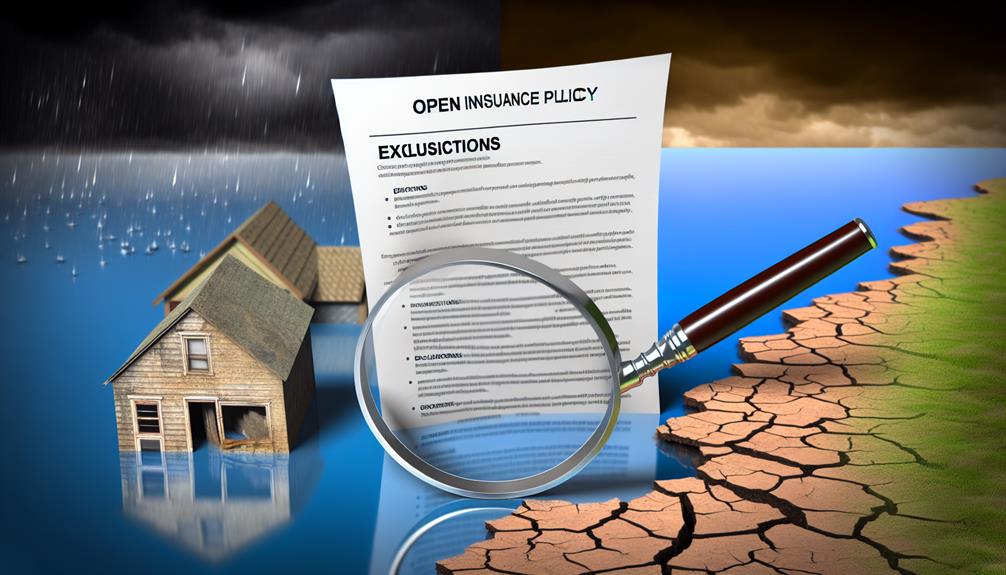Like a ticking time bomb, natural disasters can strike when you least expect them, making it essential for you to evaluate home insurance policies that include flood and earthquake coverage. Standard homeowners insurance often falls short, leaving you vulnerable to significant financial loss. If you're in a high-risk area, understanding the nuances of these additional coverages could be the difference between security and disaster. But what factors should you weigh when selecting the right policy? Exploring these factors might just save you from an unexpected setback.
Key Takeaways
- Standard homeowners insurance does not cover flood and earthquake damage, requiring separate policies for each risk.
- Earthquake insurance covers structural damage, personal property losses, and additional living expenses, with coverage limits varying from $5,000 to $25,000.
- Flood insurance protects against severe damage from flooding, offering up to $250,000 for building coverage and $100,000 for personal contents.
- Bundling flood and earthquake insurance can lead to cost savings, with discounts reducing overall premiums by up to 25%.
- Regular policy reviews are essential to identify coverage gaps and ensure adequate protection against specific risks in high-risk areas.
Understanding Earthquake Insurance
Understanding earthquake insurance is vital for homeowners in seismically active areas, as standard policies often leave you unprotected against such disasters. Unlike typical homeowners insurance policies, earthquake insurance specifically covers structural damage to your residence, personal property losses, and additional living expenses if you're displaced due to an earthquake.
When choosing earthquake insurance, you can tailor your policy to fit your needs. Coverage can include dwelling protection, personal property coverage, and loss of use, with coverage limits for personal property usually ranging from $5,000 to $25,000. Keep in mind that most policies come with deductibles, which can be a set amount or a percentage of the damage. Deductibles typically range from 5% to 20% of your coverage limit, so it's important to understand how this impacts your potential payout.
Every two years, homeowners insurance providers are mandated to offer earthquake insurance, giving you written offers that detail your coverage limits, deductibles, and premiums. This guarantees you're always aware of your options and can make informed choices about protecting your home from seismic threats.
Importance of Flood Coverage
Having flood coverage can make a significant difference in protecting your home and finances from unexpected disasters. Flooding can lead to severe damage, with just one inch of water causing thousands of dollars in repair costs. Many people assume they're safe in low-risk areas, but over 20% of flood claims come from these zones, highlighting the unpredictable nature of flooding events. Standard homeowners insurance typically excludes flood damage, which means you need separate flood insurance for thorough protection.
If your property is in a flood-prone zone, it faces a 1% or greater annual chance of flooding, making flood coverage essential, especially in high-risk areas. The average annual cost of flood insurance through the National Flood Insurance Program (NFIP) is about $859, a small price to pay compared to potential financial loss from flooding. Without proper flood coverage, you risk facing overwhelming repair costs that could devastate your finances. By investing in flood insurance, you're not just protecting your property; you're safeguarding your financial future against the unexpected. Don't wait for a disaster to realize the importance of flood coverage.
How to Purchase Coverage

When you're ready to purchase flood or earthquake coverage, the first step is to check with your current homeowners insurance provider. They're required to offer earthquake insurance every two years, so you can easily explore your options. If you're looking for a flood insurance policy, you can obtain it through the National Flood Insurance Program (NFIP) or private insurers. Keep in mind that coverage limits for building property can reach up to $250,000, while personal contents are capped at $100,000.
Next, it's essential to gather multiple quotes from different insurance providers. This way, you can compare coverage options, limits, and deductibles. Remember, earthquake coverage premiums typically range from $800 to $5,000 annually, depending on factors like your location and the materials used in your home's construction.
As you review policy details, be alert for specific exclusions that could affect your protection, such as coverage for temporary housing expenses or damages to outdoor property. Taking these steps guarantees you make an informed decision that best suits your needs for flood and earthquake coverage.
Coverage Options Explained
Flood and earthquake coverage options can feel overwhelming, but knowing what each policy offers helps you make the right choice for your home. Standard homeowners policies typically exclude flood and earthquake damage, so you'll need separate insurance.
For earthquake coverage, your policy can protect against structural damage, personal property loss, and additional living expenses if your home becomes uninhabitable due to earthquake damage. Keep in mind that earthquake insurance premiums vary markedly, influenced by your home's location and construction. Deductibles can range from 5% to 20%, impacting your out-of-pocket expenses.
Flood insurance policies provide two main coverage options: building coverage, which protects up to $250,000, and personal contents coverage, limited to $100,000. The insurance deductibles for flood coverage typically range from $1,000 to $10,000, which you should factor into your budget.
Both flood and earthquake insurance rates are determined by various factors, including your property's age and materials. Understanding these coverage options will help you choose the right policies to safeguard your home against natural disasters, ensuring peace of mind when disaster strikes.
Special Considerations for Renters

For renters, understanding the importance of earthquake insurance is essential, especially since standard renters insurance usually doesn't cover earthquake damage. If you live in high-risk earthquake zones, consider securing earthquake insurance to protect your personal belongings. Most policies will cover your personal property and even additional living expenses if you're displaced due to an earthquake.
When selecting a plan, it's important to evaluate the value of your items since coverage limits can vary considerably. Living in seismically active areas increases your risk, and over 90% of Americans are situated in these zones, making earthquake insurance a smart choice.
Additionally, some policies designed for renters may include coverage for temporary housing costs while your rental is being repaired. This can alleviate the financial burden of finding alternative accommodations after an earthquake.
While flood insurance might be another consideration for renters, it's critical to confirm that earthquake insurance is part of your overall protection strategy. By addressing these special considerations, you can safeguard your valuables and maintain peace of mind in unpredictable situations.
Filing a Claim Process
Discovering damage to your property can be overwhelming, but acting quickly is fundamental to guarantee a smooth claims process. Start by notifying your insurance company immediately to initiate this process. You must document all damage meticulously; take detailed photographs and keep receipts. This evidence will support your claim and may expedite approval.
It's important to report claims within one year of discovering damage to avoid a claim denied scenario. Your insurance company is obligated to open a claim upon receiving your report. Maintain communication records, noting names and details of conversations for future reference.
Understanding your policy coverage and the claims process timeline is significant. If your claim is denied or underpaid, you have rights to appeal.
Here's a quick reference table to help you navigate the claims process:
| Step | Action Required | Key Considerations |
|---|---|---|
| 1. Notify Insurance | Report claims immediately | Timely reporting is important |
| 2. Document Damage | Take photos and keep receipts | Evidence support is needed |
| 3. Maintain Records | Keep communication records | Essential for claims |
| 4. Understand Rights | Know your rights to appeal | Be prepared for a challenge |
Cost Factors for Insurance

Understanding the cost factors of insurance is critical for homeowners, especially after filing a claim. When considering earthquake insurance, you'll find premiums typically range from $800 to $5,000 annually. These costs depend on various risk factors, like your home's age, location, and construction materials. If you live near a fault line, expect higher premiums due to the increased potential for damage.
Flood insurance is another consideration, with average costs around $939 per year as of 2023. Your premiums for flood insurance will largely depend on your property's flood risk, the type of coverage you choose, and the deductibles you select. Common deductibles for flood policies can range from $1,000 to $10,000, which can greatly impact your out-of-pocket expenses during a claim.
Both earthquake and flood insurance policies include coverage limits, which determine the maximum amount your policy covers in case of damage. Additionally, earthquake insurance deductibles usually range from 5% to 20% of the coverage limit. Lower deductibles can mean higher premiums, so it's crucial to evaluate what works best for your financial situation when working with insurance providers.
Benefits of Combined Coverage
Combining flood and earthquake insurance into a single policy can greatly simplify your coverage management. With this combined coverage, you can enjoy numerous benefits that enhance your protection against natural disasters. Here are some key advantages:
- Streamlined Claims Process: Managing one policy is easier than juggling multiple insurance policies, making it simpler to navigate claims after a disaster.
- Cost Savings: Many insurers offer discounts for bundling, potentially lowering your overall premiums by up to 25%.
- Comprehensive Protection: You'll safeguard against significant financial losses, as flooding and earthquakes can lead to tens of thousands of dollars in damages.
- Peace of Mind: Knowing you're covered for both flood and earthquake risks provides reassurance, especially in high-risk areas where these disasters are prevalent.
Reviewing Policy Exclusions

When reviewing your home insurance policy, it's vital to pay close attention to the exclusions that could leave you vulnerable. Policy exclusions in earthquake insurance typically don't cover fire damage resulting from an earthquake or damage caused to land, such as sinkholes and erosion. Similarly, flood insurance policies exclude coverage for mold and mildew damage, temporary housing expenses, and outdoor property like fences and landscaping.
You should also be aware that vehicles and valuable papers aren't covered under either type of insurance, highlighting the need for separate coverage for these items. Specific exclusions in earthquake insurance can even include damage caused by flooding resulting from an earthquake, emphasizing the significance of having both earthquake and flood insurance for thorough protection.
As a homeowner, it's important to review your policies thoroughly to understand these exclusions and guarantee you have adequate coverage for risks specific to your location. Don't wait until it's too late—make sure you're protected against potential hazards by addressing these exclusions in your homeowners insurance.
Frequently Asked Questions
Does Homeowners Insurance Cover Earthquakes and Floods?
Homeowners insurance usually doesn't cover earthquakes or floods. If you live in an area prone to these disasters, it's wise to evaluate separate policies. Earthquake insurance protects your home and belongings from quake-related damage, while flood insurance is essential, even for low-risk zones, since a small amount of water can cause significant harm. Assess your location's risk factors and make sure you're adequately covered to avoid costly repairs later.
Which Homeowners Policy Covers Earthquake?
If you're looking for a homeowners policy that covers earthquakes, you'll likely need to obtain separate earthquake insurance. Most standard policies don't include this coverage. You can add it as an endorsement or rider, but expect higher premiums. Alternatively, standalone earthquake insurance is available from licensed providers. Be sure to check with your insurance agent to discuss your options, coverage limits, and any additional costs involved in safeguarding your home against earthquakes.
Is Earthquake Coverage Worth It?
Think of earthquake coverage as a safety net beneath a tightrope walker; it's there to catch you when things go wrong. Whether it's worth it depends on where you live and your risk tolerance. If you're in a seismic zone, the potential costs of damage can far exceed the insurance premiums. Investing in earthquake coverage can provide peace of mind and financial protection, helping you recover more smoothly after a quake strikes.
What Does the Earthquake Endorsement on a Homeowners Policy Cover?
The earthquake endorsement on your homeowners policy covers structural damage from seismic activity, including aftershocks within 72 hours. It also protects personal property, typically up to a limit of $5,000 to $25,000. If you're displaced due to earthquake damage, it includes coverage for additional living expenses, like temporary housing. However, damages related to land, landscaping, pools, and separate structures like garages aren't covered under this endorsement.
